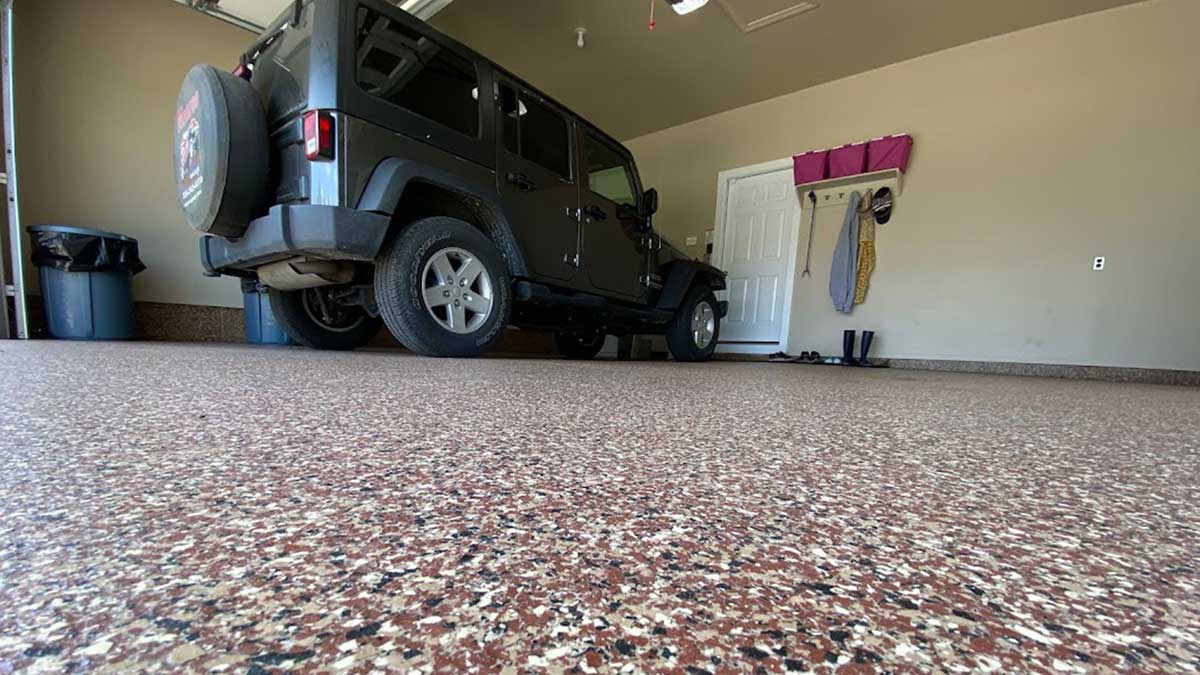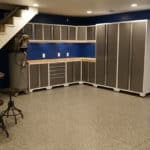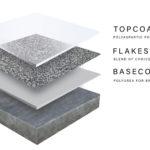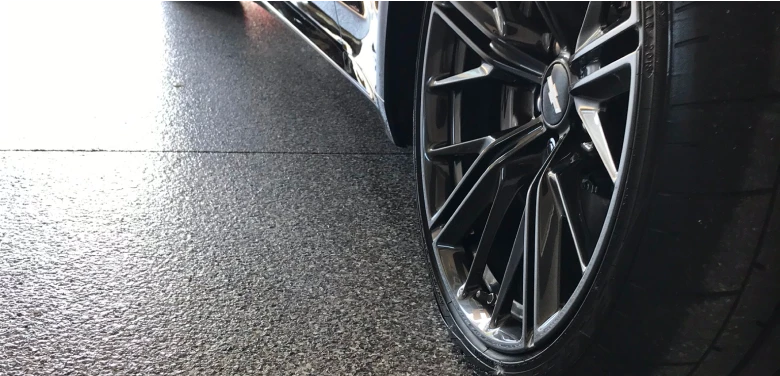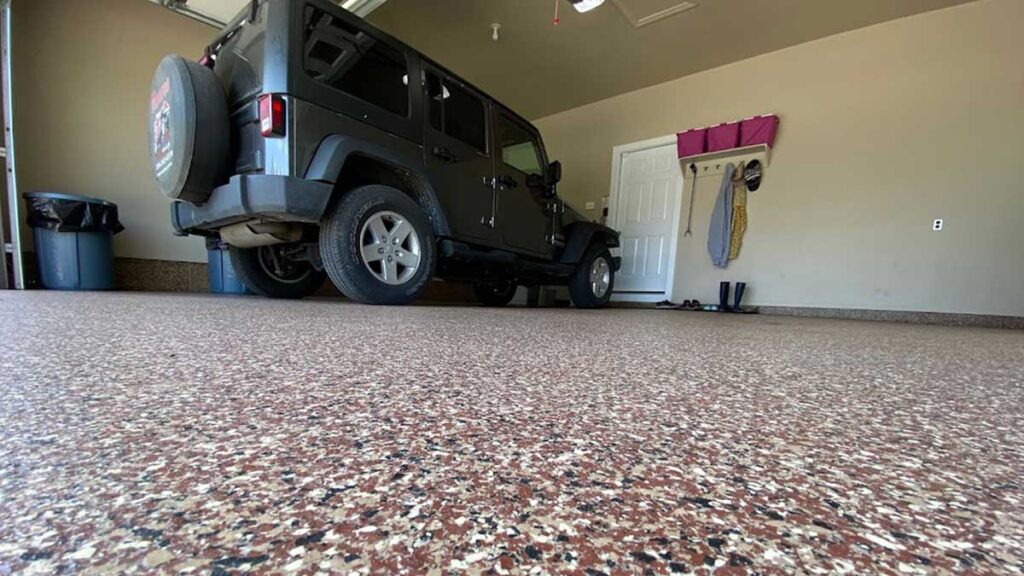
Polyurea is a type of polymer that businesses have now used for several decades in a variety of industrial and commercial applications. More recently, it has found a market with residential flooring. As a matter of fact, polyurea is an increasingly population coating option for garage floors and basement floors. In this article, we will explore the history of polyurea in garage floor coatings: how scientists developed it, how we use it today, and its benefits over traditional coatings like epoxy and latex.
A Bit of History
The development of polyurea as a coating material began in the 1950s, when scientists at the Bayer Corporation in Germany began experimenting with the use of polyurethane in industrial coatings. Polyurethane is a polymer resulting from the reaction of a polyisocyanate and a polyalcohol. Bayer discovered that by adding a third component, such as an amine, the resulting polymer could become even more durable and flexible. The company named this new type of polymer “polyurea.”
In the 1970s, contractors started to use polyurea in commercial and industrial applications, such as protective coatings for pipelines and storage tanks. However, it wasn’t until the 1990s that general contractors began to use it as a coating material for garage floors.
The main advantage of polyurea over traditional coatings such as epoxy, is its ability to cure quickly. Epoxy coatings can take several days to cure, whereas polyurea cures in a matter of hours. This makes the latter a much more convenient and efficient option in both residential and commercial applications, as it minimizes the downtime and inconvenience inherent to the coating process.
Polyurea Today…
Today, polyurea has found a wide market in garage and basement floor coating applications, but also on other surfaces such as concrete floors, pool decks, even roofs. The main benefits of polyurea for residential customers are its durability, flexibility, and ability to withstand foot and car traffic as well as extreme temperature swings. Polyurea is also resistant to chemicals such as oil and gasoline, which makes it very practical for garage floors and locations exposed to chemical spills.
More About the Properties of Polyurea
One of the key advantages of polyurea is its durability. This material is resistant to abrasion and impact, making it well-suited for use in areas such as garage floors where foot traffic and tires exert continuous pressure on the flooring. Additionally, polyurea is resistant to chemical spills.
Polyurea is highly flexible. It expands and contracts with the movement of the concrete beneath it. Flexibility helps preventing cracking and flaking, a problem typical of traditional epoxy coatings.
Additionally, polyurea withstand a wide range of temperatures, making it suitable for use in both hot and cold climates. In Michigan, very cold temperatures are typically a problem for coated basements and garage floors, walkways, pool decks, and patios. And when the summer comes, the swing to higher temperatures also becomes an issue.
Anyone who coated a floor with epoxy knows that sunlight changes the color of the epoxy over time. UV rays interact chemically with the material and change its color to a faded yellow. If your garage door remains open during the summer, you will see differences in the aspect of your epoxy coating between the sun-exposed areas and the shade-protected areas. Polyurea is UV-resistant, which preserves the aesthetics of your floor coating much longer.
Another benefit of polyurea is its ability to cure quickly. From the homeowner experience, that’s a major adoption point vs. epoxy: people are reluctant (for good reasons) to leave their cars outside, having to stay away from their garage for days at a time, and having to move their belongings out. Coat your basement or garage floor with polyurea, and you will be able to use the space again in a very short while.
Key Takeways About Polyurea Floor Coating
- Polyurea is a polymer businesses have used for several decades in industrial and commercial applications
- Since the 1990s, it has become an increasingly popular option for coating basement and garage floors, but also outdoor areas
- The main benefits of polyurea include durability, flexibility, and ability to withstand a wide range of temperatures
- Polyurea is resistant to chemical spills
- Polyurea cures much faster than epoxy
How Can MotorCity Help With Your Floor Coating?
MotorCity Floors and Coatings is a floor coating specialist based in Novi, MI and operating for decades in the Detroit Metro area. We serve families and businesses for all types of floor coating applications. In the residential market, we take care of coating projects on garage floors, basement floors, walkways, patios, pool decks, and staircases. In the commercial and industrial markets, we have a long experience with epoxy and polyurea coatings in a variety of applications: school gyms and hallways, workshop and machine shop floors with and without markings, showroom floors at dealerships, warehouse floors, reception halls, etc.
Coating a floor is a long-term investment that you should be making with full knowledge of what you can expect as far as durability, capacities, maintenance and clean-up, and expected deterioration over time. Our coating specialists have years of experience to offer during the decision phase, and we are glad to help you make the most appropriate decision for your situation. Call us at (248) 613-5888 or send us a message here to discuss your project with no commitment on your part. We will advise you to the best of our abilities, and if you so desire, we will give you a quote for your project.

